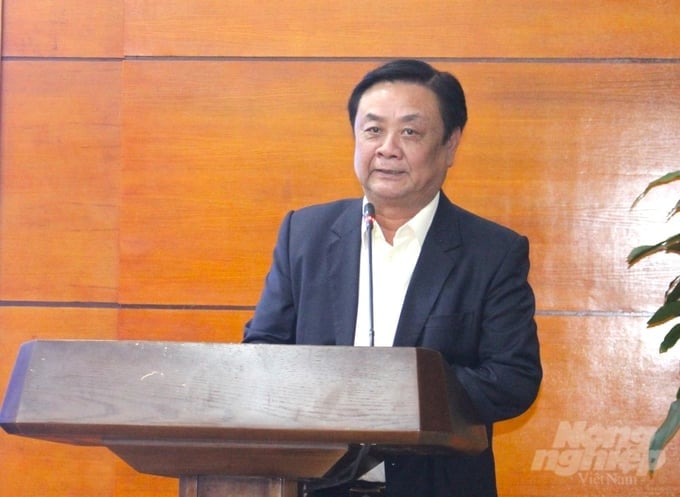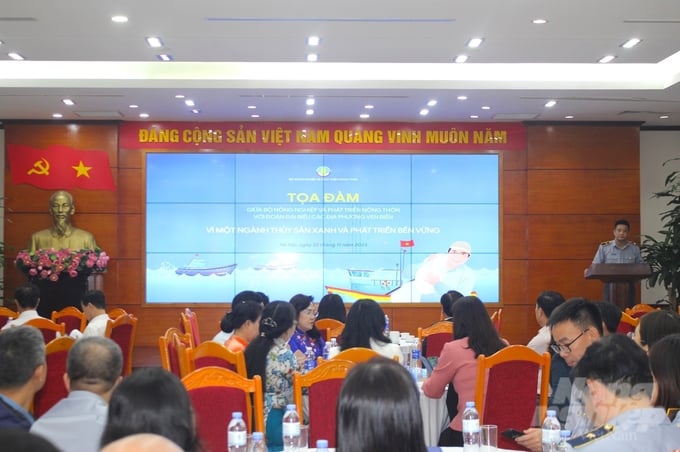May 17, 2025 | 15:41 GMT +7
May 17, 2025 | 15:41 GMT +7
Hotline: 0913.378.918
May 17, 2025 | 15:41 GMT +7
Hotline: 0913.378.918

According to Minister of Agriculture and Rural Development Le Minh Hoan, achieving sustainable development in the aquacultural sector and lifting the European Commission's "yellow card" requires collaborative efforts from various ministries, sectors, and local governments. Photo: Trung Quan.
According to Mr. Tran Dinh Luan, General Director of the Directorate of Fisheries, Vietnam currently has more than 86,000 fishing vessels, 83 fishing ports, 7,500 mariculture facilities, and 76 anchoring zones, providing employment for nearly 4 million workers nationwide. Additionally, the fisheries industry has achieved a growth rate of 4.9% per year, contributing to 25% of the GDP in the agricultural sector.
Vietnam's aquaculture activities currently face a multitude of difficulties and challenges, including climate change, saltwater intrusion, sovereignty disputes in the East Sea, increasing and widespread imposition of technical barriers (EC's yellow card, etc.), unsustainable development, low production efficiency, slow improvement and sustainability of fishermen's livelihoods. Additionally, environmental degradation, limited infrastructure, fragmented and spontaneous production also pose as significant obstacles.
The fundamental causes for these issues include the imbalance between exploitation pressure and resource capacity, limited infrastructure investment with inadequate focus on vocational training, insufficient resource assessment and management, restricted local central management capacity, ineffective value chain linkages, weak law enforcement, and inadequate attention to fisheries resource protection.
According to Mr. Luan, the Ministry of Agriculture and Rural Development believes that the development of the fisheries industry is synonymous with the prosperity of fishermen. In addition, the restructuring of the fisheries industry will result in the shift from unsustainable resource exploitation to sustainable economic development of fisheries resource. This task will involve maintaining the sustainability of fisheries resources, preventing the exploitation of juvenile fish, reducing exploitation, increasing the scale of aquaculture, and protecting fisheries resources to create alternative livelihoods for fishermen.
Mr. Nguyen Quang Hung, General Director of the Department of Fisheries Surveillance, reported that marine fisheries resources are currently in steep decline from 5.07 million tons between 2000 and 2005 to 3.95 million tons between 2016 and 2020. On the other hand, the number of fishing vessels in operation exceeds sustainable levels, with over 3.6 million tons of seafood caught in 2022.
Efforts to lift the European Commission's "yellow card" have seen positive developments. Nevertheless, there are several issues to be resolved. Consequently, the Ministry will focus on implementing the European Commission's five recommendations to lift the "yellow card" before June 2024. These include refining the legal framework, effectively managing fishing fleets, ensuring traceability of product origin, strictly enforcing legal regulations, and preventing IUU violations in foreign waters. Accordingly, drastic measures will be taken to prevent fishing vessels and fishermen from engaging in illegal fishing activities in foreign waters, and to address the issue of VMS disconnection before April 2024.

The Ministry of Agriculture and Rural Development urges representatives of the National Assembly delegations from coastal regions to provide information regarding the concerns and difficulties of local residents. This will enable timely adjustments for the sustainable development of the fisheries industry. Photo: Trung Quan.
According to Minister of Agriculture and Rural Development Le Minh Hoan, achieving sustainable development in the aquacultural sector and lifting the European Commission's "yellow card" requires collaborative efforts from various ministries, sectors, and local governments. Vietnam's current priority mission involves preventing IUU fishing activities, and its long-term mission involves protecting the nation's natural resources for future generations. As a result, it is essential to restructure the industry and guide fishermen along a unified trajectory.
When the Ministry of Agriculture and Rural Development first introduced the policy to develop mariculture with the aim of reducing exploitation and increasing output, multiple local governments have eagerly called for investments from local businesses without considering the priority subject for profession transitioning, which is the local fisherman forces.
"Active dialogue is necessary to encourage fishermen to voluntarily transition from their professions and reduce exploitation. Namely, we must listen to concerns and focus resources on solving these difficulties. When fishermen realize that profession transitioning is a meaningful endeavor, and their livelihoods are still guaranteed, we can work towards the goal of sustainable aquaculture development," emphasized Minister Le Minh Hoan.
Minister Hoan noted that local businesses and individuals are hesitant to invest in mariculture due to concerns regarding planned areas. As a result, the local governments of coastal regions must promptly refine their planning and profession transitioning projects, thereby encouraging investments from businesses and individuals.
In 2024, the Ministry of Agriculture and Rural Development will guide the fisheries industry to strengthen the organization of fishing guilds, creating a common platform for fishermen to interact, share concerns, and support one another in their work and lives. Additionally, community management structures will be re-established according to the issued guidelines.
On the other hand, the National Assembly delegations from various provinces and cities are expected to, through elector meetings, assess the difficulties, shortcomings, concerns, and needs of local fishermen, and convey this information to the Ministry of Agriculture and Rural Development. This will enable timely adjustments to strategies, policies, and management methods in response to the needs of the fisheries industry, fishermen, and fishing communities.
Translated by Nguyen Hai Long

(VAN) Muong Nhe Nature Reserve hopes that being upgraded to a national park will lay the foundation for forest protection efforts to be carried out in a systematic, modern, and sustainable manner.
/2025/05/16/3923-2-171845_52.jpg)
(VAN) Lower costs, higher yields, and improved soil quality are outstanding benefits that soybeans bring when integrated into the crop rotation system.

(VAN) The 'For a Green National Environment' programme aims to promote a green lifestyle, support businesses in implementing ESG practices, and turn Net Zero commitments into concrete actions.

(VAN) Cold-barn systems efficiently manage environmental and temperature conditions, which aids in the prevention of respiratory diseases in pigs and protects them from the vectors that transmit African swine fevers.

(VAN) To tackle challenges, the project 'Addressing key technical bottlenecks in the grouper supply chain in Vietnam' has been underway since 2024.

(VAN) The project 'Disease-Resilient and Sustainable Cassava Production Systems in the Mekong Region', funded by the Australian Center for International Agricultural Research (ACIAR), is being implemented from 2024 to 2028.

(VAN) Data from 10,000 farming households will help professionalize production organization and support the implementation of the One Million Hectares Program for High-Quality, Low-Emission Rice Cultivation.